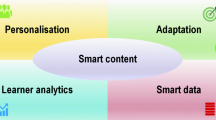Abstract
A smart learning environment (SLE) is characterized by the key provision of personalized learning experiences. To approach different degrees of personalization in online learning, this paper introduces a framework called SCALE that tracks finer level learning experiences and translates them into opportunities for custom feedback. A prototype version of the SCALE system has been used in a study to track the habits of novice programmers. Growth of coding competencies of first year engineering students has been captured in a continuous manner. Students have been provided with customized feedback to optimize their learning path in programming. This paper describes key aspects of our research with the SCALE system and highlights results of the study.
Access this chapter
Tax calculation will be finalised at checkout
Purchases are for personal use only
Preview
Unable to display preview. Download preview PDF.
Similar content being viewed by others
References
Burghardt, C., Reisse, C., Heider, T., Giersich, M. & Kirste, T. (2008). Implementing Scenarios in a Smart Learning Environment. 2008 Sixth Annual IEEE International Conference on Pervasive Computing and Communications (pp. 377-382).
Kim, S., Song, S.-M. & Yoon, Y.-I. (2011). Smart Learning Services Based on Smart Cloud Computing. Sensors 11, 7835-7850.
Aion, N., Helmandollar, L., Wang, M. & Ng, J. (2012). Intelligent Campus (iCampus) Impact Study. 2012 IEEE/WIC/ACM International Conferences on Web Intelligence and Intelligent Agent Technology (WI-IAT), Vol. 3 (pp. 291-295).
Lee, J., Jung, Y. J., Park, S. R., Yu, J., Jin, D.-s. & Cho, K. (2012). A Ubiquitous Smart Learning Platform for the 21st Smart Learners in an Advanced Science and Engineering Education. 2012 15th International Conference on Network-Based Information Systems (NBiS) (pp. 733-738).
Huang, R., Hu, Y., Yang, J. & Xiao, G. The Functions of Smart Classroom in Smart Learning Age.
Cioara, T., Anghel, I., Salomie, I., Dinsoreanu, M., Copil, G. & Moldovan, D. (2010). A selfadapting algorithm for context aware systems. 2010 Ninth Roedunet International Conference (RoEduNet) (pp. 374-379).
Koo, D.-H. (2012). Trends and Revitalization of Smart-Learning in Elementary and Middle Schools. Asian Journal of Information Technology, 160-168.
Mikulecký, P. (2012). Smart Environments for Smart Learning.
Yu, Z., Zhou, X. & Shu, L. (2009). Towards a semantic infrastructure for context-aware e-learning. (pp. 71-86).
Yu, Z., Nakamura, Y., Jang, S., Kajita, S. & Mase, K. (2007). Ontology-Based Semantic Recommendation for Context-Aware E-Learning. (pp. 898-907).
Akiyoshi, M. & Nishida, S. (1993). A qualitative simulation-based learning environment: how to enhance causal understanding of complex phenomena in large-scale plants. 1993 Twelfth Annual International Phoenix Conference on Computers and Communications (pp. 531-537).
Blikstein, P. (2011). Using Learning Analytics to Assess Students’ Behavior in Open-ended Programming Tasks. In Proceedings of the 1st International Conference on Learning Analytics and Knowledge (pp. 110-116). ACM.
Castro, F., Mugica, F. & Nebot, A. (2007). Causal Relevancy Approaches to Improve the Students’ Prediction Performance in an e-Learning Environment. 2007 Sixth Mexican International Conference on Artificial Intelligence - Special Session (pp. 342-351).
Fancsali, S. E. (2011). Variable Construction for Predictive and Causal Modeling of Online Education Data. In Proceedings of the 1st International Conference on Learning Analytics and Knowledge (pp. 54-63). ACM.
Santos, J. L., Govaerts, S., Verbert, K. & Duval, E. (2012). Goal-oriented Visualizations of Activity Tracking: A Case Study with Engineering Students. In Proceedings of the 2nd International Conference on Learning Analytics and Knowledge (pp. 143-152). ACM.
Yu, T. & Jo, I.-H. (2014). Educational Technology Approach Toward Learning Analytics: Relationship Between Student Online Behavior and Learning Performance in Higher Education. In Proceedings of the Fourth International Conference on Learning Analytics and Knowledge (pp. 269-270). ACM.
Kosba, E., Dimitrova, V., Boyle, R. (2005). Using Student and Group Models to Support Teachers in Web-Based Distance Education. In Proceedings of the 10th International Conference on User Modeling, Edinburgh, UK (pp. 124-133).
Lee, S., Barker, T., Kumar, V. (2014). Self-Directed Learning. Educational Technology & Society, in preparation.
Lee, S., Barker, T., Kumar, V. (2011). Learning Preferences and Self-Regulation - Design of a Learner-Directed e-Learning Model. International Conferences ASEA, DRBC and EL 2011, Software Engineering, Business Continuity and Education. Communications in Computer and Information Science, Springer Link, Volume 257, pp. 579-589.
Lee, S., Barker, T., Kumar, V. (2011). Models of eLearning: The Development of a Learner- Directed Adaptive eLearning System. In Sue Greener and Asher Rospigliosi (eds.), Proceedings of the European conference on e-learning held in University of Brighton, Brighton, UK, November 10-11, 2011 (pp. 390-398).
Lee, S., Barker, T., Kumar, V. (2010). Approaches to Student Modeling in the Context of e-Learning 2.0. In Paula Escudeiro (ed.), Proceeding of the 9th European conference on e-learning, pp. 59-66.
Kumar, V., Manimalar, P., Somasundaram, T. S., Sidhan, M., Lee, S., El-Kadi, M. (2009). Open Instructional Design. Technology for Education (T4E 2009) (pp.43-50).
Seanosky, J., Boulanger, D., Kumar, V. & Kinshuk (2014). Unfolding Learning Analytics for Big Data. ICSLE 2014, in preparation.
Author information
Authors and Affiliations
Corresponding author
Editor information
Editors and Affiliations
Rights and permissions
Copyright information
© 2015 Springer-Verlag Berlin Heidelberg
About this paper
Cite this paper
Boulanger, D., Seanosky, J., Kumar, V., Kinshuk, Panneerselvam, K., Thamarai Selvi Somasundaram (2015). Smart Learning Analytics. In: Chen, G., Kumar, V., Kinshuk, ., Huang, R., Kong, S. (eds) Emerging Issues in Smart Learning. Lecture Notes in Educational Technology. Springer, Berlin, Heidelberg. https://doi.org/10.1007/978-3-662-44188-6_39
Download citation
DOI: https://doi.org/10.1007/978-3-662-44188-6_39
Published:
Publisher Name: Springer, Berlin, Heidelberg
Print ISBN: 978-3-662-44187-9
Online ISBN: 978-3-662-44188-6
eBook Packages: Humanities, Social Sciences and LawSocial Sciences (R0)




